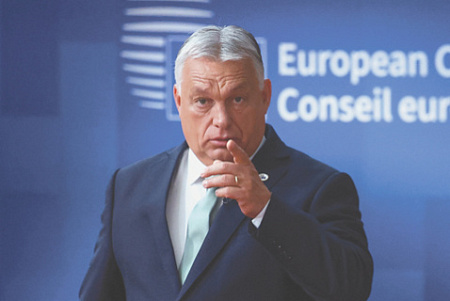
Hungarian Prime Minister Viktor Orbán has positioned himself as the sole EU leader to publicly dissent from the bloc’s unified stance on Ukraine, arguing against the principle of “no negotiations about Ukraine without Ukraine.” This move comes as Orbán, Europe’s longest-serving leader, leverages a contentious foreign policy to navigate a brewing political storm at home, with a challenging parliamentary election looming in April 2026 amid a deteriorating economic climate for his Fidesz party.
Orbán has not only voiced his dissent on social media but has also attempted to sway his European counterparts away from what he describes as a one-sided policy favoring Kyiv. He has called for the EU to initiate its own high-level summit with Russia, asserting that the bloc has lost its strategic autonomy by aligning so closely with Ukraine. In a pointed act of defiance, Hungary was the only member state to refuse to endorse a recent joint EU declaration, a decision Orbán justified by objecting to the document’s support for Ukraine’s eventual EU membership.
While Orbán’s affinity for Moscow has often been attributed to Hungary’s reliance on Russian energy, his rhetoric is increasingly focused on national security. With an election campaign unofficially underway, the Prime Minister has made the “Ukrainian threat” a central theme. He has accused Kyiv and Brussels of conspiring to install a “puppet government” in Budapest and warned that Ukraine’s EU accession would flood Hungary with cheap labor and subpar agricultural goods, directly targeting his main political rival, Péter Magyar of the Tisza party, whom he portrays as dangerously pro-Ukrainian.
After 15 years in power, Orbán faces what could be his most significant political challenge. Hungary’s economy is under severe strain, having experienced a peak inflation rate of over 25% in early 2023, far exceeding the EU average. Public dissatisfaction with rising prices and declining living standards is eroding support for Fidesz, while the opposition Tisza party gains momentum in the polls. Observers anticipate Orbán may resort to familiar populist economic measures, such as tax cuts and public sector pay raises, though economists warn this could further weaken the national currency and spike inflation.
According to political analysts, the current landscape is turning against the Fidesz leader as the opposition appears more strategic and unified than in previous elections. In a significant move, the Momentum Movement party has decided not to contest the election, aiming to consolidate the anti-government vote behind a single political force rather than a fragmented coalition. For many Hungarians, new political figures represent a hope for change and an improved standard of living, creating a real possibility that Orbán’s long tenure could come to an end.
